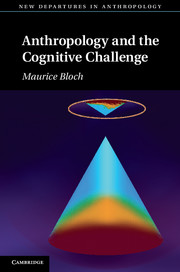Book contents
- Frontmatter
- Contents
- Acknowledgements
- 1 Why anthropologists cannot avoid cognitive issues and what they gain from these
- 2 Innateness and social scientists' fears
- 3 How anthropology abandoned a naturalist epistemology: a cognitive perspective on the history of anthropology
- 4 The nature/culture wars
- 5 Time and the anthropologists
- 6 Reconciling social science and cognitive science notions of the ‘self ’
- 7 What goes without saying
- 8 Memory
- References
- Index
7 - What goes without saying
Published online by Cambridge University Press: 05 August 2012
- Frontmatter
- Contents
- Acknowledgements
- 1 Why anthropologists cannot avoid cognitive issues and what they gain from these
- 2 Innateness and social scientists' fears
- 3 How anthropology abandoned a naturalist epistemology: a cognitive perspective on the history of anthropology
- 4 The nature/culture wars
- 5 Time and the anthropologists
- 6 Reconciling social science and cognitive science notions of the ‘self ’
- 7 What goes without saying
- 8 Memory
- References
- Index
Summary
In chapter 5, I argued that anthropologists often mistakenly identify what are imaginative meta-representations as though these were more basic understandings of time which organise inference and ordinary action. Similarly, in the previous chapter, I argued that anthropologists often mistake imaginative meta-representations of the individual, the self or the person for that knowledge of oneself and others which organises more ordinary and more basic inference and action. Through such misrepresentation, anthropologists are easily led to produce falsely exoticising accounts resulting in such arguments that there are two fundamentally different types of people in the world. These mistakes are indirectly and partly caused by thinking of ‘culture’ as a self-contained independent system opposed to ‘nature’. This is the negative part of the argument. More positively, however, and also in the two previous chapters, I drew attention to elements which are often ignored as a result of the exclusive consideration of these imaginative meta-representations. The reason for these omissions comes in part from the fact that these occasional meta-representations come ready made in explicit and well-formulated language and are thus easily reproducible in ethnographies.
The implicit or the unexpressed is, by definition, much more difficult to reproduce and isolate. What is involved simply cannot be grasped in other ways than in practice and together with other, more fundamental, levels which are constitutive parts of the processes of minds and bodies; processes which are in some cases more or less similar to processes occurring in other primates and even in more remotely related animate beings.
- Type
- Chapter
- Information
- Anthropology and the Cognitive Challenge , pp. 143 - 185Publisher: Cambridge University PressPrint publication year: 2012

